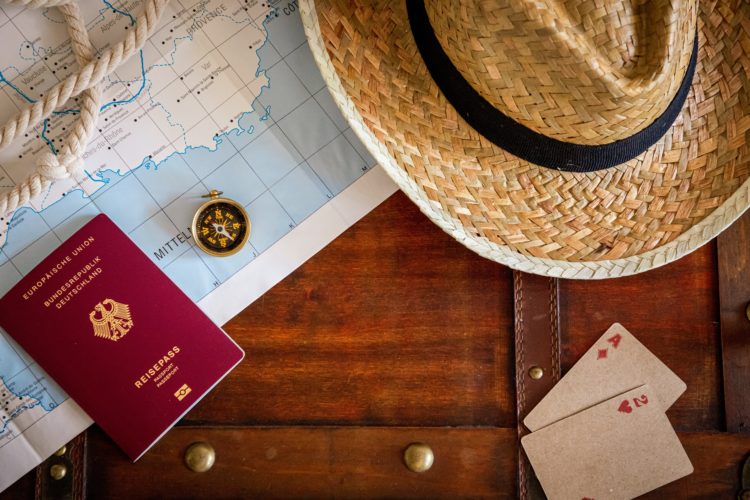Actually, it doesn't really matter whether you are preparing a trip around the world, a two-month backpacking trip or a two-week holiday - it doesn't change the planning process a lot. Even frequent travelers can sometimes get bogged down in all the things that need to be considered. I myself am one of those people who prefer to pack in the morning of the day of the trip rather than the evening before and almost never plan hotels or the exact route in advance. But there are some things you should think about early. I have prepared this travel checklist so that you don't suddenly find out that you have moved your entire trip into the rainy season, are too late for the required vaccination, or that you had imagined the whole thing completely differently.
Time & Duration
The first thing you should think about is how long and at what time you can actually travel. For example, if you have children and are dependent on the official school holidays, you will probably plan your longest trip over the European summer. At this time, however, many destinations are already cancelled because the conditions are not ideal. Most Central American and Asian countries are in rainy season during these months and on the Australian continent it is even winter.
The European beaches are particularly suitable for a beach holiday at this time of year. However, this is also the main tourist season and most places are accordingly full and expensive. In Denmark the beaches are often quite empty even in the middle of summer - but here you don't have a good weather guarantee like in southern European countries.
If, on the other hand, you are flexible in terms of time, I would recommend that you postpone longer trips until the European winter. At this time of the year there are optimal travel conditions in many parts of the world and you will avoid the cold and too many tourists.
You don't have more than a week? Then it may be smarter to plan a city trip within Europe than trying to discover a whole country within that time. If you have more than two weeks, you can start thinking about long-distance. In many small countries (Belize, Guatemala, Honduras, Morocco Ghana) you can even see most of the country in two weeks.
However, I prefer flying to another continent for several months and exploring several countries overland. This way you will learn more about culture and people than if you visit only one country. And of course it saves you a lot of miles over the year.
When you have more than four weeks for a trip, you don't need to plan your route in detail, but can simply decide on the spot how to proceed.
If you have special plans for your trip, such as surfing, skiing or wildlife watching, you have to make sure that the conditions and season are right.
Some countries also have certain holidays that you should keep in mind when planning your trip. For example, during Ramadan in Muslim countries it is impolite to eat in public during the day and many restaurants are even closed.
Destination & type of travel
Depending on how flexible you are, you can narrow down your desired destination quickly. Afterwards you should think about how you would like to travel there. Do you want to drift with a backpack on your back, sleep in hostels or camp? Or do you prefer to stay in a comfortable hotel? The second you should better book in advance. Do you want to use public transport or rent a car yourself?
In places with less tourism or infrastructure, it may be worthwhile to rent a motorhome or camper directly so that you do not have to rely on free hotel beds or fixed times. Read here everything about my Road trip through the Australian outback in a camper!
If you are traveling with several people, you should clarify your expectations and preferences beforehand, so that there are no discussions during the trip, because some of you prefer a different travel style than others.
Visa
The stupidest thing that could happen to you, would be that you would not be let into a country in the first place. Therefore, once your destination has been determined, you should decide whether you need a visa and if so, what kind. Although most visas are issued relatively quickly, there are usually deadlines that you must meet. In any case, you should find out beforehand on the website of the Federal Foreign Office whether you can get the visa directly at the airport in the country of entry or whether you have to apply for it in advance at the respective foreign mission. As owners of a German passport, we are lucky to be able to enter most countries without any problems - nevertheless, it is worth checking in advance.
If you have booked your outward and return flight from the same place, but want to travel to other countries in between, the total travel time must not exceed the time you are allowed to stay in country number one. If, after traveling for months, you only want to return to one country for the return flight, you can also prove this by buying flight tickets. I once entered Mexico without a visa and had to prove a return flight. But since I wanted to travel further through South America after my stay in Mexico, I booked the return flight for a random date from Mexico City. Unfortunately, the date was more than 180 days in the future, and thus more than I was allowed to stay in Mexico. Because of this they almost didn't let me on the plane. So in case of doubt it is always better to apply for a visa to be on the safe side.
Special case Cuba
One of the most stressful entries for me was the one to Cuba. Not only do you need a tourist card in advance (costs about 30 Euro), without which you are not allowed to enter the country - you also have to keep the same amount of money to be let out of the country again. If you have ever been to Africa before, it is best to prepare yourself for a long interrogation at the airport. Cuba is very strict about possible imported diseases. You must also consider that direct entry to or from the USA is still not possible.
Working Visa
If you want to work in a country besides travelling, you almost always need a special visa. For this, you often have to prove that you already have an employment contract. An exception are the typical Work&Travel countries like Australia, New Zealand or Canada. It is best to find out in advance whether you can get a Work&Travel visa with your nationality or whether you have to enter with a student visa. You will get this, for example, if you take a language course and it allows you to work a certain number of hours per week on the side.
Travel planning: Money
Latest at the point when you run out of money in the middle of nowhere and have not had the opportunity to get cash or pay with your card, you better plan for the future.
Credit cards
Ideally you should always have two credit cards with you, one to just leave in your accommodation. It can happen very quickly that your wallet or bank card is stolen from the machine right in front of you (yes, I have experienced that as well). Even if you have your card blocked immediately - you won't be able to get any cash for the moment either.
I always use a special prepaid credit card on the road, to which I transfer small amounts of money weekly. Like that, even if I get forced to withdraw money, there is not much to get.
The normal debit card does not work at all in some countries (for example in Cuba). Without a credit card you are completely lost there.
Cash
Paying cash is of course always the easiest way and you can exchange it immediately anywhere. However, I almost never carry cash with me. It is the first to be gone, once you get robbed or lose your backpack or purse.
In case of emergency, you can have money sent from home to abroad, for example via Western Union. This is also possible without an account and only with your identity card.
I like to use my credit card, with which I can take money all over the world for free and am not dependent on partner banks.
Vaccination
If you are planning a trip to a tropical or generally non-European country, you should first visit the CDC page to learn about mandatory or recommended vaccinations. The obligatory vaccinations (mostly against yellow fever) must be proved in any case when entering the country. But even if no vaccination is required, it is worthwhile to get advice from a travel doctor. Make sure you do so in good time, because some vaccinations have to be repeated within several months to provide full protection. You can only get the yellow fever vaccination at certified vaccination centres or at the public health department after prior notification.
Important documents
I was often close to fly to another European country which didn't belong to the European Union without a passport, only with my identity card. Remember that you always need a passport for these countries and always check immediately how long your passport is still valid. Many countries require it to be valid for at least another six months when you leave the country. A copy of your passport can also be useful if you lose yours or it gets stolen.
If you want to rent a car locally, in non-European countries the international driving licence is mandatory. You can get it for about 20 Euros at the nearest driving licence office, on presentation of your national driving licence and your identity card. Also make sure to bring a recent passport photo.
Travel insurance
Within the EU you do not need to worry about an extra foreign health insurance. However, in some countries outside the EU it can be expensive if something happens and you are not insured. Make sure that your insurance covers as much as possible, especially if you are traveling for a long time . .
Some insurance companies allow you, to only pay the administrative costs while you are gone. Since there is a compulsory insurance in Germany, you can also cancel your insurance completely. In any case, the insurance company is obliged to take you back after your return.
Route planning
Especially on longer journeys things often go a little differently than planned. Nevertheless, you should always determine an approximate route, even if you do not stick to it exactly afterwards. Think about what you would like to see on the way and how much time you will need for it. I do not like to book domestic flights, trains or buses in advance. However, I do think about after how many days I might leave a place to see what is possible during that time. But you should not book a strict route from home that leaves no room for spontaneity. If you want to stay longer than planned, it is often difficult to change your travel plans.
Travel Planning: Final thoughts
If you know when and where you want to travel, the biggest step in travel planning is already done. After that, it's all about taking care of documents such as passport, visa and driver's license and any necessary vaccinations. It's best to start planning your trip as early as possible - the more relaxed you are when you get started.
If you want to know how to find cheap flights and hotels? Read my article about it.

